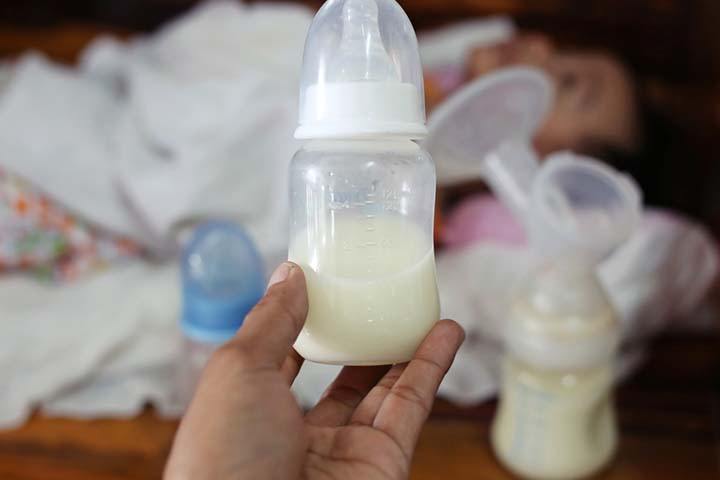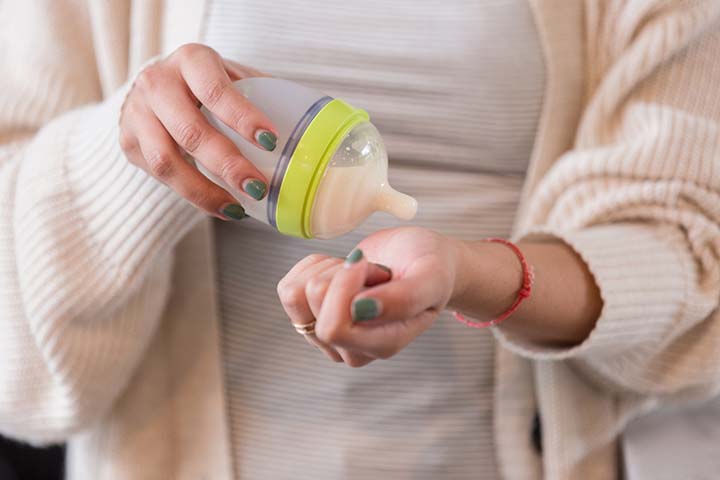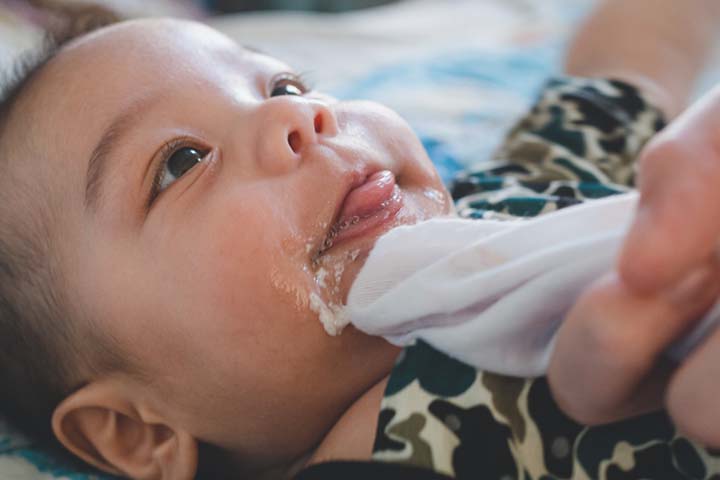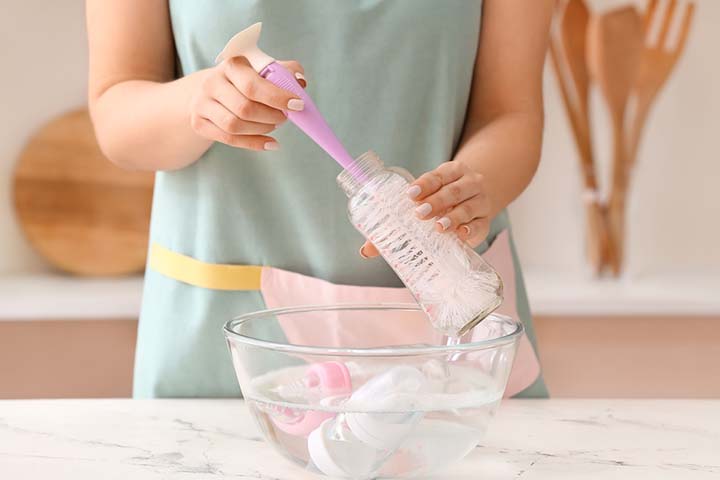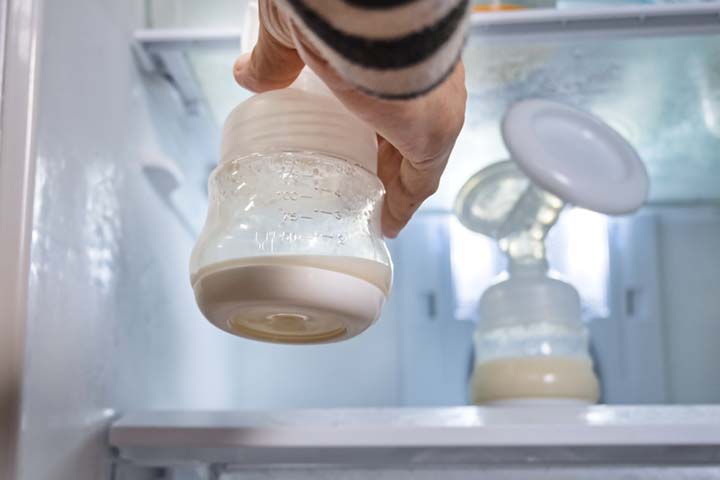When you start feeding stored (expressed or pumped) breast milk to your baby, the first question that you may have is how to know if breast milk has gone bad?
Breast milk contains several nutrients, immunological components, and enzymes. Upon storage, changes in one or more of these components cause alteration in the breast milk’s appearance, smell, and taste.
Several parents report stored breast milk tasting and smelling soapy, while others describe it as metallic. In either case, understanding why these changes occur can help you learn the signs that indicate that the milk has gone bad.
Read on to know the signs that tell the breast milk has gone bad and ways to prevent spoilage.
Signs Indicating The Breast Milk Has Gone Bad
Breast milk’s taste and smell vary from one mother to another. Therefore, knowing the common signs indicating milk spoilage can prevent you from feeding your baby spoiled milk.
Here are some ways you can determine milk’s fitness for consumption.
1. Appearance
Upon storage, breast milk typically separates into two layers — milk and cream layer. The fat rises to the top to form the cream layer, while the bottom layer is called the milk layer (1).
When milk is still fit for consumption, a quick swirl causes the layers to dissolve (2). However, if your breast milk appears chunky or maintains separate layers even after swirling a couple of times, the milk has likely gone bad.
2. Smell
Breast milk’s odor could vary among mothers and even across feeding sessions. These changes are based on several factors, such as the mother’s diet and medications. Besides, an off or soapy smell is a relatively common occurrence for mothers with high lipaseiXAn enzyme that the body requires to break down fats in food for easy absorption into the intestines-containing breast milk (3). In such a case, determining spoilage isn’t easy. However, a simple test could help.
For the test, freeze a small amount of your breast milk for a week.After a week, you can try thawing the milk and checking its scent.
- If you have high lipase milk, your milk will likely smell soapy, metallic, or fishy. However, the milk is fit for the baby’s consumption. You can deactivate lipase activity by scalding breast milk.
- If the milk is rancid or has a sour smell, then the milk has undergone chemical oxidation. Discarding such milk is advisable. A diet rich in PUFAiXPolyunsaturated fats are dietary fats essential for blood clotting, nerve function, and brain health or rancid fats and water containing free copper and iron ions could cause oxidation, giving a peculiar smell to breast milk.
Describing the smell of her breast milk that she had refrigerated, first time mother Kate says, “Yesterday I defrosted some breast milk I had in the freezer. I have used frozen milk earlier with no problem, but this time something was different. I defrosted the bag in the refrigerator overnight and when I went to use it, it smelled gross. Not like spoiled milk, really, just gross. Kind of plastic-y and very strong. I could smell it from across the room (i).”
3. Taste
If breast milk tastes rancid or sour, it has likely gone bad. You can perform the same test as above — store the milk for a week and evaluate the taste changes. Soapy-, metallic-, or fishy-tasting breast milk is likely due to high lipase activity. On the other hand, a sour or rancid taste indicates chemical oxidation.
In general, breast milk stored longer than recommended may indicate that milk might have gone bad. Freshly pumped or expressed milk stored in the refrigerator for more than four days or previously frozen and thawediXTo convert from a frozen state to a liquid state milk stored for more than a day are likely to go bad (4).
What Happens When A Baby Consumes Spoiled Breast Milk?
You may sometimes not know that your stored breast milk has gone bad. In such instances, accidental feeding of spoiled milk is possible. A baby may exhibit the following signs when they ingest spoiled breast milk.
- Refusal to feed: Experts believe that persistent refusal to feed can signify that the baby doesn’t like the milk’s taste (5). In case your baby is persistently refusing to consume stored breast milk or acts too fussy while feeding, check the taste of your milk for spoilage. When a breastfeeding baby refuses to feed, it is known as a nursing strike that may have several other reasons, including lactation or latching issues.
- Frequent spitting up or vomiting: Babies have sensitive digestive systems. If they consume spoiled breast milk, they are likely to experience gastrointestinal disturbances, such as diarrhea and vomiting. Some babies may also feel a lot gassier and pass odd-colored stools. If you notice your baby throwing up repeatedly, frequently passing watery stools after the feed, or displaying other digestive issues, check your breast milk and milk supply and consult a pediatrician.
- Fever: Although uncommon, some babies may develop low to high degree fever after ingesting spoiled milk. It usually happens when the milk has been contaminated by bacteria, most likely due to improper milk handling and storage hygiene. In such cases, babies develop fever a few hours after ingesting the stored milk, often with additional symptoms, such as vomiting and diarrhea.
- Severe infection: In rare cases, feeding spoiled milk to babies can lead to life-threatening infections, such as Cronobacter Sakazakii infectioniXA severe blood infection where the brain and spinal cord lining might also swell (6). This infection can cause severe medical issues for the baby’s health, such as meningitisiX Inflammation of the spinal cord and brain’s protective membranesand sepsisiXA life-threatening condition that happens when the body destroys its tissues and organs in response to an infection(6). It is why the Centers for Disease Control and Prevention (CDC) recommend rigorously following the guidelines for proper handling and storage of human breast milk (4).
Some other symptoms that may arise due to spoiled milk consumption are dehydration leading to excessive sleepiness and inactivity, dark-colored urine, and fewer wet nappies than usual. If you suspect your baby has any health issues and related signs due to breast milk consumption, consult a pediatrician for guidance.
Tips To Prevent Expressed/Pumped Breast Milk From Spoiling
Below are the recommended guidelines to express or pump and store breast milk to maintain its quality (4) (8).
- Wash your hands and breasts with clean water and soap before pumping or expressing breast milk.
- Adequately clean and sanitize your breast pump and accessories, including the storage containers after every use.
- Discard the breast pump and its accessories if you notice a mold in their tubing or the equipment looks worn out.
- Tightly close the storage bottle or container’s lid so that the milk is safe from chemical oxidation and absorption of odor from other veggies and fruit.
- Thaw breast milk in order of storage, meaning thaw oldest breast milk first. Don’t refreeze thawed breast milk.
- Check stored breast milk for spoilage before feeding it to the baby. You may do so by checking the taste, color, and consistency of the breast milk.
- Don’t freeze the refrigerated milk to extend its storage time. You should keep the milk in the refrigerator immediately after pumping. The milk can stay at 40°F (4°C) with proper refrigeration for four to six days. However, do not move the bottle to the freezer after six days to extend its storage life. When frozen immediately after pumping, the milk should preferably be consumed within six months if the freezer is separate from the refrigerator and two weeks if the freezer is inside the refrigerator (2). Always place freezer milk at the back of the freezer and never on the door.
- Never store breast milk in the door of the refrigerator. Place the milk container at the back of the refrigerator where the temperature is coldest and stable since it is unaffected by the door’s opening and closing.
- Place the storage container in an insulated cooler bag or cool towel for a few minutes if you cannot immediately place it in the refrigerator. Freshly expressed or pumped breast milk can stay consumable at 60 to 85°F (16 to 29°C) for up to four hours. Remember, the longer the milk stays outside, the higher the chances of it going rancid.
- Keep the breast milk away from direct sunlight, heat, and air until you store it in the refrigerator or freezer.
- Avoid untreated tap water use for cleaning of breast milk storage accessories to prevent milk’s chemical oxidation during storage. You may also restrict supplements rich in unsaturated fats, such as fish oil tablets, if your breast milk is sensitive to oxidation and goes rancid easily.
Breast milk is susceptible to degradation soon. Since breast milk pumping and storage is a hectic process, understanding the mechanism behind milk’s degradation could be helpful. If you have expressed milk, ensure it is refrigerated immediately. Store the milk in an insulated cooler bag in impossible situations, but refrigerate it within four hours. Strictly adhere to the CDC’s guidelines on breast milk pumping and storage. If you suspect that the milk has gone rancid, check for its quality before feeding it to the baby. Alternatively, observe the baby for any signs of discomfort or other health signs after feeding them breastmilk. You may even consult a pediatrician for prompt medical attention if you notice any such symptoms.
Key Pointers
- Curdled or chunky appearance of stored breast milk may indicate spoiled breast milk.
- A baby refusing to feed, frequent spitting up, and fever may indicate the baby has ingested spoilt milk.
- Frequent hand washing, proper cleaning, and sanitation of breast pump accessories are some ways to prevent breastmilk from getting spoilt.
“Wondering why your breast milk tastes sour after freezing and thawing? Find out why and what you can do about it in this video”

